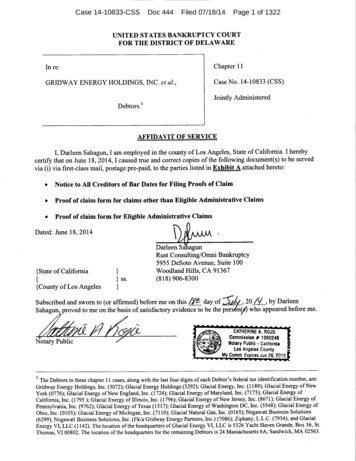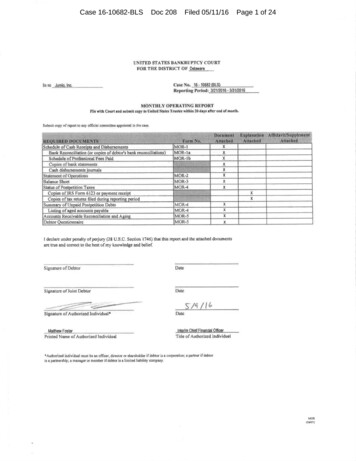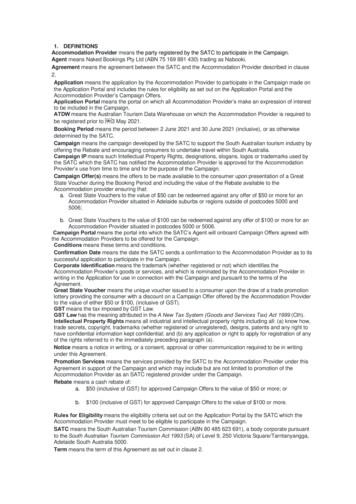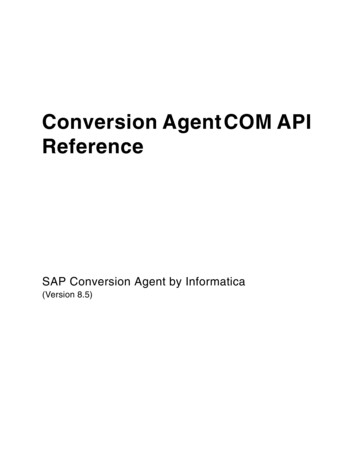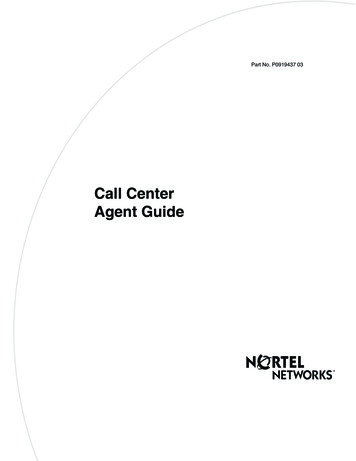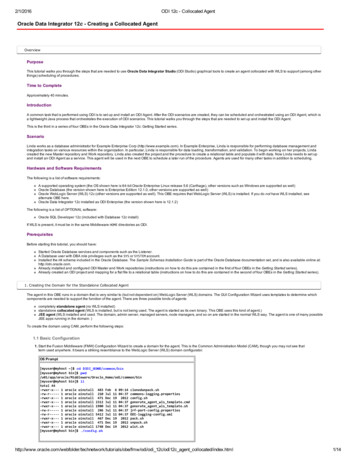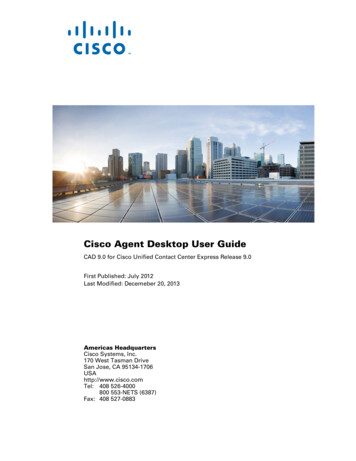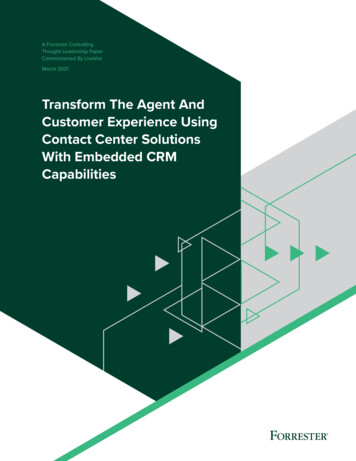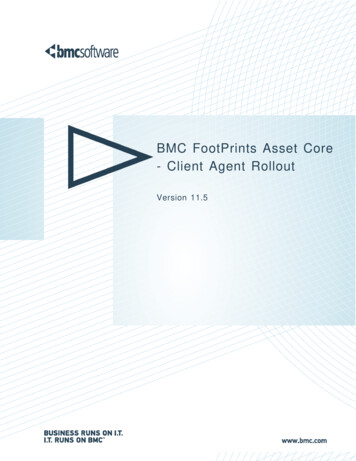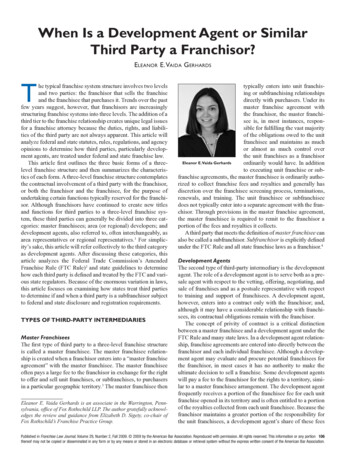
Transcription
When Is a Development Agent or SimilarThird Party a Franchisor?Eleanor E. Vaida GerhardsThe typical franchise system structure involves two levelsand two parties: the franchisor that sells the franchiseand the franchisee that purchases it. Trends over the pastfew years suggest, however, that franchisors are increasinglystructuring franchise systems into three levels. The addition of athird tier to the franchise relationship creates unique legal issuesfor a franchise attorney because the duties, rights, and liabilities of the third party are not always apparent. This article willanalyze federal and state statutes, rules, regulations, and agencyopinions to determine how third parties, particularly development agents, are treated under federal and state franchise law.This article first outlines the three basic forms of a threelevel franchise structure and then summarizes the characteristics of each form. A three-level franchise structure contemplatesthe contractual involvement of a third party with the franchisor,or both the franchisor and the franchisee, for the purpose ofundertaking certain functions typically reserved for the franchisor. Although franchisors have continued to create new titlesand functions for third parties to a three-level franchise system, these third parties can generally be divided into three categories: master franchisees; area (or regional) developers; anddevelopment agents, also referred to, often interchangeably, asarea representatives or regional representatives.1 For simplicity’s sake, this article will refer collectively to the third categoryas development agents. After discussing these categories, thisarticle analyzes the Federal Trade Commission’s AmendedFranchise Rule (FTC Rule)2 and state guidelines to determinehow each third party is defined and treated by the FTC and various state regulators. Because of the enormous variation in laws,this article focuses on examining how states treat third partiesto determine if and when a third party is a subfranchisor subjectto federal and state disclosure and registration requirements.Types of Third-Party IntermediariesMaster FranchiseesThe first type of third party to a three-level franchise structureis called a master franchisee. The master franchisee relationship is created when a franchisor enters into a “master franchiseagreement” with the master franchisee. The master franchiseeoften pays a large fee to the franchisor in exchange for the rightto offer and sell unit franchises, or subfranchises, to purchasersin a particular geographic territory.3 The master franchisee thenEleanor E. Vaida Gerhards is an associate in the Warrington, Pennsylvania, office of Fox Rothschild LLP. The author gratefully acknowledges the review and guidance from Elizabeth D. Sigety, co-chair ofFox Rothschild’s Franchise Practice Group.typically enters into unit franchising or subfranchising relationshipsdirectly with purchasers. Under itsmaster franchise agreement withthe franchisor, the master franchisee is, in most instances, responsible for fulfilling the vast majorityof the obligations owed to the unitfranchisee and maintains as muchor almost as much control overthe unit franchises as a franchisorEleanor E.Vaida Gerhardsordinarily would have. In additionto executing unit franchise or subfranchise agreements, the master franchisee is ordinarily authorized to collect franchise fees and royalties and generally hasdiscretion over the franchisee screening process, terminations,renewals, and training. The unit franchisee or subfranchiseedoes not typically enter into a separate agreement with the franchisor. Through provisions in the master franchise agreement,the master franchisee is required to remit to the franchisor aportion of the fees and royalties it collects.A third party that meets the definition of master franchisee canalso be called a subfranchisor. Subfranchisor is explicitly definedunder the FTC Rule and all state franchise laws as a franchisor.4Development AgentsThe second type of third-party intermediary is the developmentagent. The role of a development agent is to serve both as a presale agent with respect to the vetting, offering, negotiating, andsale of franchises and as a postsale representative with respectto training and support of franchisees. A development agent,however, enters into a contract only with the franchisor; and,although it may have a considerable relationship with franchisees, its contractual obligations remain with the franchisor.The concept of privity of contract is a critical distinctionbetween a master franchisee and a development agent under theFTC Rule and many state laws. In a development agent relationship, franchise agreements are entered into directly between thefranchisor and each individual franchisee. Although a development agent may evaluate and procure potential franchisees forthe franchisor, in most cases it has no authority to make theultimate decision to sell a franchise. Some development agentswill pay a fee to the franchisor for the rights to a territory, similar to a master franchisee arrangement. The development agentfrequently receives a portion of the franchisee fee for each unitfranchise opened in its territory and is often entitled to a portionof the royalties collected from each unit franchisee. Because thefranchisor maintains a greater portion of the responsibility forthe unit franchisees, a development agent’s share of these feesPublished in Franchise Law Journal, Volume 29, Number 2, Fall 2009. 2009 by the American Bar Association. Reproduced with permission. All rights reserved. This information or any portion 106thereof may not be copied or disseminated in any form or by any means or stored in an electronic database or retrieval system without the express written consent of the American Bar Association.
and royalties is often much lower than that of a master franchisee. This arrangement is often desirable for franchisors thatwish to penetrate a market quickly but may not be comfortablesurrendering the level of control and supervision required for amaster franchisee relationship.As discussed later in this article, a development agent isregarded as a subfranchisor in certain states.Area DevelopersOften confused with the development agent (also known asan area or regional representative, as noted above) is the areadeveloper or regional developer. An area or regional developeris simply a franchisee given the right by a franchisor to openand develop multiple franchises within a fixed geographic location. The franchisor will require the area or regional developerto execute both an area developer agreement, or area representative agreement, and individual unit franchise agreementsfor each franchise opened in the area or regional developer’sterritory. The area developer or area representative agreementwill outline exactly how many unit franchises must be openedwithin the territory and in what time period the units must beopened; this is usually referred to as the development schedule.The area developer will own each of the unit franchises openedand may oversee one or a small number of the units within itsterritory, but it will find managers to run the day-to-day operations of the majority of the units.Indefinable Third PartyPart of the confusion in labeling three-level franchise structuresoriginates from the fact that such labels are often used interchangeably or incorrectly by franchisors as well as the legalcommunity. The confusion grows when the FTC and state regulators define and regulate these third-party arrangements differently from one another. For example, the term area franchise isoften used to described the master franchisee or subfranchisorarrangement under state law, but it is not a term used under theFTC Rule.5In addition, innovative franchisors continue to create newstructures that do not easily fit into one of the foregoing threelevel franchise system categories. For instance, franchisorsincreasingly operate under a hybrid area representative/developer system. In this hybrid structure, a third party enters into anagreement with a franchisor to purchase development rights to aparticular geographic territory. The agreement contains a quotasetting forth the number of franchise outlets that must be soldwithin the territory by a certain deadline. However, it often offersflexibility by providing that the third party can meet the quota byowning, opening, and operating the franchise units itself or byselling the rights to open outlets to individual franchisees.Each three-level franchise arrangement has different legalconsequences, so it is important that a franchise structure bedesigned with an understanding of how that structure is likelyto be categorized by the FTC Rule and various state laws. Without knowing the legal implications of each arrangement, theparties may create unintended duties or undertake unintentionalresponsibilities. A franchise attorney must be aware of how theFTC and state regulators analyze these relationships becausethe labels chosen by the parties will not govern the parties’rights and duties or their treatment under the various applicablelaws and regulations.Why Involve a Third Party?Although the legal status of these arrangements can be confusing, there are numerous reasons why a three-level franchisestructure may benefit a franchise system. Third parties oftenpay franchisors a significant fee for the rights to develop or sellin a certain territory. A franchisor can expand its business intoareas that it might not otherwise have the capital or resourcesto enter by itself. There are a number of other benefits in addition to increased revenue and enhanced growth.6 In many cases,the third party will have greater familiarity with the geographic area, which provides the franchise system with enhancedknowledge of the real estate, marketplace, and opportunities forfranchisees. However, despite the benefits, three-level franchisesystems also create legal ambiguities that should be clarifiedbefore making a decision to use them. The first task of the franchisor or franchise attorney is to determine the type of structurethat will best suit the franchisor in question and then analyze thetreatment of that structure under federal and state law.Federal and State Franchise DisclosureA frequent question raised by franchisors interested in utilizing a three-level franchise structure is whether federal and statefranchise laws require disclosure, registration, or both. Criticalquestions may include (1) whether a franchisor must disclosethe third party in its Franchise Disclosure Document (FDD),(2) whether the third party is subject to federal and state franchise disclosure and registration laws, and (3) whether the thirdparty must disclose the franchisor’s applicable information inits FDD if it is subject to federal and state franchise laws.FTC RuleWhen the amended FTC Rule was released in January 2007, itdid not provide extensive guidance for attorneys representingthree-level franchisor clients.7 As attorneys began drafting thenew form of disclosure document, it soon became apparent thatfurther direction from the FTC and state regulators was necessary. Under the FTC Rule, franchisor is defined as “any personwho grants a franchise and participates in the franchise relationship. Unless otherwise stated, it includes subfranchisors.” 8 Thedefinition continues by stating that “a ‘subfranchisor’ means aperson who functions as a franchisor by engaging in both presale activities and post-sale performance.”9Although it was clear from the FTC Rule that the definition of franchisor included subfranchisors, it was not clearwhat type of third party would meet the definition of subfranchisor. An FTC staff opinion clarified the definition offranchisor soon after the release of the FTC Rule.10 The staffopinion is in question-and-answer form and queries, amongother things, whether a development agent should be treatedas a subfranchisor under the FTC Rule.11 The FTC replied bystating that a development agent party is not a subfranchisor unless “that person is a party to the franchise agreementPublished in Franchise Law Journal, Volume 29, Number 2, Fall 2009. 2009 by the American Bar Association. Reproduced with permission. All rights reserved. This information or any portion 107thereof may not be copied or disseminated in any form or by any means or stored in an electronic database or retrieval system without the express written consent of the American Bar Association.
should be disclosed by a franchisor or how or if a third party(or to another agreement involved in the franchise).”12 The staffshould disclose itself. The FTC Compliance Guide (Compliopinion added that this requirement was applicable “regardlessance Guide) released in May 2008 assists in answering manyof the name given to the person, be it ‘development agent,’of these questions.18‘area developer,’ or ‘regional developer.’”13The FTC’s staff answer to the question of defining franchiIn accordance with the Compliance Guide, both a franchisorsor was formulated by analyzing the definitions of subfranchiand a subfranchisor must prepare an FDD.19 “Both the fransor under the FTC Rule. According to the FTC, the descriptionchisor and any subfranchisor are responsible for each other’sof a subfranchisor as a “person who functions as a franchisor bycompliance with the amended [FTC] Rule and are jointly andengaging in both pre-sale and post-sale performance” encomseverally liable for each other’s violations.”20 This joint liability14passes two requirements. These two requirements consist ofplaces the burden on both parties to guarantee that the disclothe subfranchisor having (1) the authority to enter into a fransures in an FDD are correct.21 The Compliance Guide states thatchise agreement or similar agreement with franchisees, andas to certain disclosures, both parties are required to supply the(2) postsale performance obligations to such franchisees as ainformation to assure the accuracy of the FDD.22 For instance,15result of entering into the agreement. The FTC states in theinformation required in Items 1–4 should always be suppliedstaff opinion that the power to enter into franchise agreementsby both the franchisor and subfranchisor, and this requirementand perform postsale obligations is unique to a franchisor.is expressly reiterated under the Item 1 specific guidelines.23When the franchisor delegates these duties and responsibilitiesIn addition, both the franchisor and subfranchisor must includeto a third party, then that third party has assumed the role of afinancial statements.2416franchisor. The focus under the FTC Rule is whether the thirdDespite this joint liability, a level of ambiguity still remains.party essentially functions as a franchisor.The Compliance Guide informs franchisors that some requiredThe FTC staff opinion attempts to interpret the FTC Ruledisclosures may only need to be supplied by one of the parties.25For example, the FTC statesby providing a bright-lineunder the Item 21 specifictest for determining when aguidelines that a subfranchithird party is deemed a subThe legal status of a three-levelsor’s financial informationfranchisor and, thus, a fran“becomes material in order tochisor. According to the stafffranchise structure can be confusing,provide prospective franchiopinion, when a third partybut such a structure may benefit asees with the opportunity toexecutes an agreement withassess that person’s financiala franchisee and providesfranchise system for many reasons.condition.”26 The informationsome form of postsale supto provide under the Item 20port, then the third party isdisclosures, however, leaves some discretion to the franchisora franchisor subject to the FTC Rule. The FTC Rule requiresand franchise attorney. Although the subfranchisor is requiredprivity of contract between the third party and the franchisee.to provide both the franchisor’s and subfranchisor’s Item 20Based on this interpretation, it is clear that a master franchiinformation, the franchisor must only provide the informationsee is a franchisor as well. It is also fairly clear that a standardif “its statistics differ materially from the subfranchisor’s stadevelopment agent is not a franchisor subject to the FTC Rule.tistics.”27 There are no additional guidelines to assist a franchiAlthough a development agent agreement generally imposessor in determining whether its statistics may differ materiallysignificant postsale support requirements on the third party, afrom the subfranchisor’s statistics. A franchise attorney woulddevelopment agent does not execute the franchise agreementswith the unit franchisees.17therefore be prudent to use the general materiality standard.The first step is to determine whether the third party willIf the omission or disclosure is likely to affect a franchisee’sbe deemed to be a franchisor under the FTC Rule. To do sodecision to purchase the franchise, then the information shouldrequires the client to determine if the third party is or will be inbe included.28privity of contract with the unit franchisees. Privity of contractThe last discussion point related to subfranchisor disclosurescan result if the third party directly executes a franchise agreeappears in the Compliance Guide’s section entitled “Instructionsment with the unit franchisee or executes a similar agreementfor Preparing Disclosure Documents.”29 The guide simply stateswith the unit franchisee that imposes postclosing requirementsthat the FDD must “include the same information required ofon the third party. If privity of contract with unit franchiseesthe franchisor for the subfranchisor, to the extent applicable.”30exists, then the third party is a franchisor under the FTC Rule,Although both parties are jointly and severally liable for anyand the franchise attorney must move forward with determiningdisclosures, the FTC does not appear to mandate that one partyhow to properly disclose the third party.be responsible for preparing the disclosures over the other.The North America Securities Administrators AssociationMechanics of Disclosure(NASAA) provides more definitive guidelines in its 2008 FranThe staff opinion helps to clarify when a third party is definedchise Guidelines (NASAA Commentary).31 Under the NASAAas a franchisor and subject to the FTC Rule, but it does notCommentary, a franchisor is not permitted to list separate chartsassist a franchise attorney in determining how a third partyin Item 20 for area developers. Area developer is defined by thedeemed to be a franchisor (by virtue of being a subfranchisor)NASAA Commentary as a “franchisee who receive[s] the rightPublished in Franchise Law Journal, Volume 29, Number 2, Fall 2009. 2009 by the American Bar Association. Reproduced with permission. All rights reserved. This information or any portion 108thereof may not be copied or disseminated in any form or by any means or stored in an electronic database or retrieval system without the express written consent of the American Bar Association.
to open multiple outlets.”32 Because an area developer does notmeet the FTC Rule definition of a subfranchisor, its informationis not required or permitted to be disclosed in Item 20. A franchisor’s contractual arrangements with area developers should,however, be disclosed as applicable in other items where disclosure is appropriate.33The NASAA disclosure guidelines are identical for both areadevelopers and development agents. A franchisor is not requiredunder the FTC Rule to disclose development agent informationin Item 20 because this form of third party also does not havea contractual relationship with franchisees and is therefore nota subfranchisor for FTC Rule purposes.34 Therefore, under theNASAA disclosure guidelines, a development agent arrangementmust be disclosed and explained under appropriate sections ofthe FDD, but a development agent does not require the extensivedisclosure mandated of a m
In a development agent relation-ship, franchise agreements are entered into directly between the franchisor and each individual franchisee. Although a develop-ment agent may evaluate and procure potential franchisees for the franchisor, in most cases it has no authority to make the ultimate decision to sell a fra
